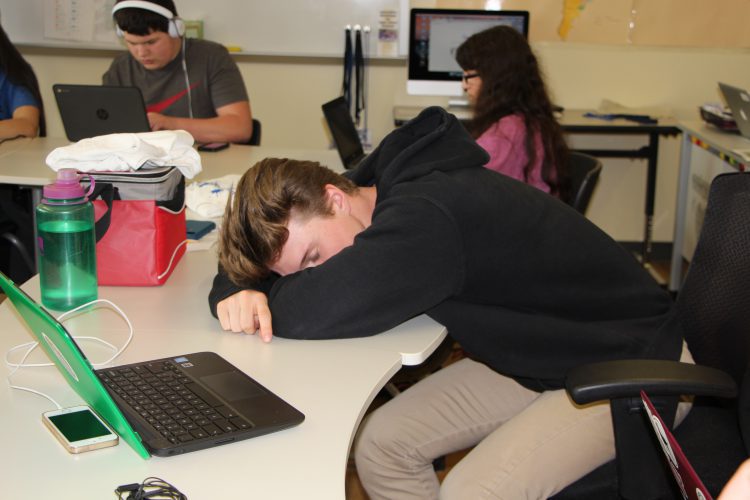Written by Logan Cummings|
Photos by Logan Cummings|
There’s nothing quite like a good night’s sleep. At Morgan, the concept is unfamiliar to many on school nights; students and teachers alike don’t get enough sleep. Such insufficient sleep can have negative effects on the teachers and students, especially in school.
Sleep offers a variety of benefits, according to a resource from the Division of Sleep Medicine at Harvard Medical School that describes the benefits of sleep. Getting the recommended 8-10 hours nightly can make a person more energized and improve memory, learning, metabolism, and the immune system. It can also improve mood. Interestingly, not only does sleep help the conscious ability to memorize and learn, but it also helps the unconscious ability to process and retain information. Overall, sleep is vital to performance in school.
Lack of sufficient sleep has many detriments. Losing sleep for only one night is not nearly as consequential as a consistent lack of sleep over an entire school year. According to a resource from the Division of Sleep Medicine at Harvard Medical School which describes the detriments of not getting enough sleep, such a lack can have negative effects on cognitive function—in other words, one’s mental performance. A person’s ability to focus is impaired, and there are negative effects upon concentration, logical reasoning, memory, and learning.
 One of the most obvious effects of sleep-deprivation is sleepiness. Sophomore Calvin Jackson claimed, “I’ve seen plenty of people doze off or fall asleep in class.” Obviously, sleeping in class is not only detrimental to the student who is sleeping and missing out on information, but it could also be distracting to others around them.
One of the most obvious effects of sleep-deprivation is sleepiness. Sophomore Calvin Jackson claimed, “I’ve seen plenty of people doze off or fall asleep in class.” Obviously, sleeping in class is not only detrimental to the student who is sleeping and missing out on information, but it could also be distracting to others around them.
The lack of sleep negatively impacts students’ performance in their classes on a daily basis. Some students are too tired to focus or retain information and fall behind in class for that reason. Calvin said, “It makes it harder to give my full attention 100% of the time. Even when I want to pay attention it can be hard to do so if I am tired due to lack of sleep.” Junior Wyatt Reu said, “Not getting enough sleep makes it difficult to pay attention in school and apply yourself to the things you’re supposed to be learning. When you don’t get enough sleep one night, the following day you fall behind in class.”
Losing sleep is also very detrimental for completing classwork and taking tests or quizzes. Junior Nina Kelly said, “I do worse on tests if I’m up all night trying to study for them. One time I fell asleep during my test, and I couldn’t finish it. During presentations that I stay up all night to make, I usually forget what I’m talking about, ramble, and have no facial expressions. This causes me to get points taken off.” Freshman Gavin Carlisle said, “It is more difficult to… take exams, and complete the assigned classwork.”
After sending surveys to the students and staff, data was gathered on their sleep-deprivation. The majority of students at Morgan get about 6 hours of sleep on a school night. Out of 169 students surveyed, only about 19% of them get the recommended 8-10 hours of sleep nightly. 77% of students claim that they lack sleep because of an overwhelming interference: homework.
Out of 121 students surveyed, 63.6% of them work on their homework at night, and 32.2% of students claim to do the majority of it at night. This can be a problem as most students claim to get 2-3 hours of homework daily, which, if worked on at night, will cut into their sleep time. 52.9% of students take 3 or more honors classes, which tends to increase the homework load. 
Students also credit sports and use of social media as reasons why they don’t get enough sleep. About 47% of students surveyed say they lose sleep from sports, and 49% say they lose sleep from using social media.
Students aren’t the only ones who don’t get enough sleep. Most faculty members get 7 hours of sleep nightly. They might not have homework keeping them up, but they’re burdened with interferences such as their kids, stress, lesson planning, grading papers, and the freedom that adults have of making their own bedtime (and, consequently, a late bedtime).
A majority of the faculty believe students get 5-7 hours of sleep on a regular school night. Their assumptions hold true, yet beg the question: Why do teachers think students are losing sleep?
Here are some of the reasons teachers listed:
- Internet/social media use
- Homework
- Gaming
- Poor time management
- Jobs
- Insomnia
- Anxiety/emotional insecurity
Without a doubt, the teachers’ most common guesses are true.
With all these interferences and late bedtimes, there’s no wonder why so many students are sleep-deprived. However, with good time management, good decisions, and a reasonable bedtime, any student or teacher can get a good night’s rest.

